Huawei Challenges Apple's Product Launch, but Apple Bows to Tencent?
![]() 09/11 2024
09/11 2024
![]() 476
476
Author | Meng Xiao
Learn More Financial Information | BT Finance Data Hub
This article contains a total of 4,964 words and is expected to take approximately 13 minutes to read
This time, Huawei chose to hold a new product launch on the same day as Apple's, directly challenging them.
At 1:00 AM Beijing time on September 10, Apple held its "Moment of Truth" themed new product launch event in Cupertino, California at Apple Park via a live broadcast. Apple unveiled its latest iPhones, Watches, and AirPods, including the iPhone 16 series, Apple Watch Series 10, AirPods 4, as well as new color options for the Apple Watch Ultra 2 and AirPods Max.
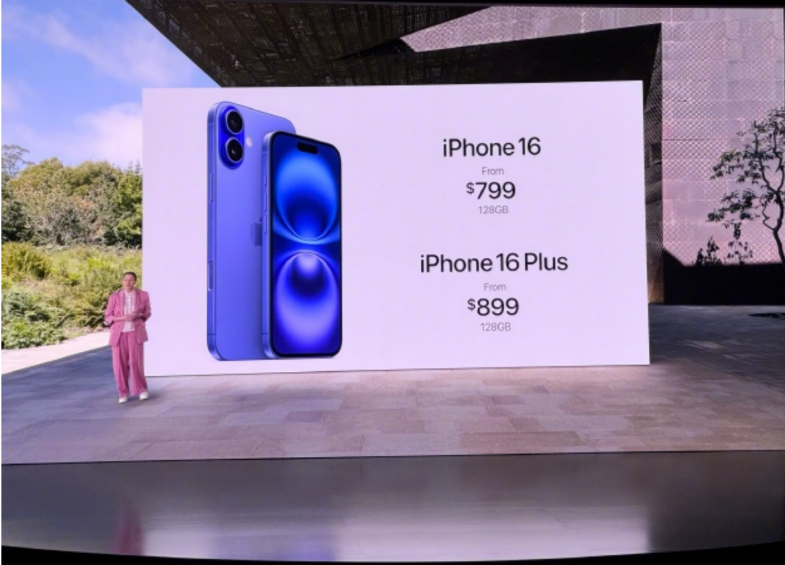
Unlike previous phone manufacturers who avoided clashing with Apple's launch events, Huawei chose to directly challenge them with their "Extraordinary Brand Ceremony and HarmonyOS New Product Launch."
Yu Chengdong posted on social media, "On September 10, at 2:30 PM, witness the extraordinary!" It was more like a challenge letter. Some Wall Street analysts believe that Apple's decision not to raise prices despite improvements in hardware capabilities is partly related to Huawei's competition.
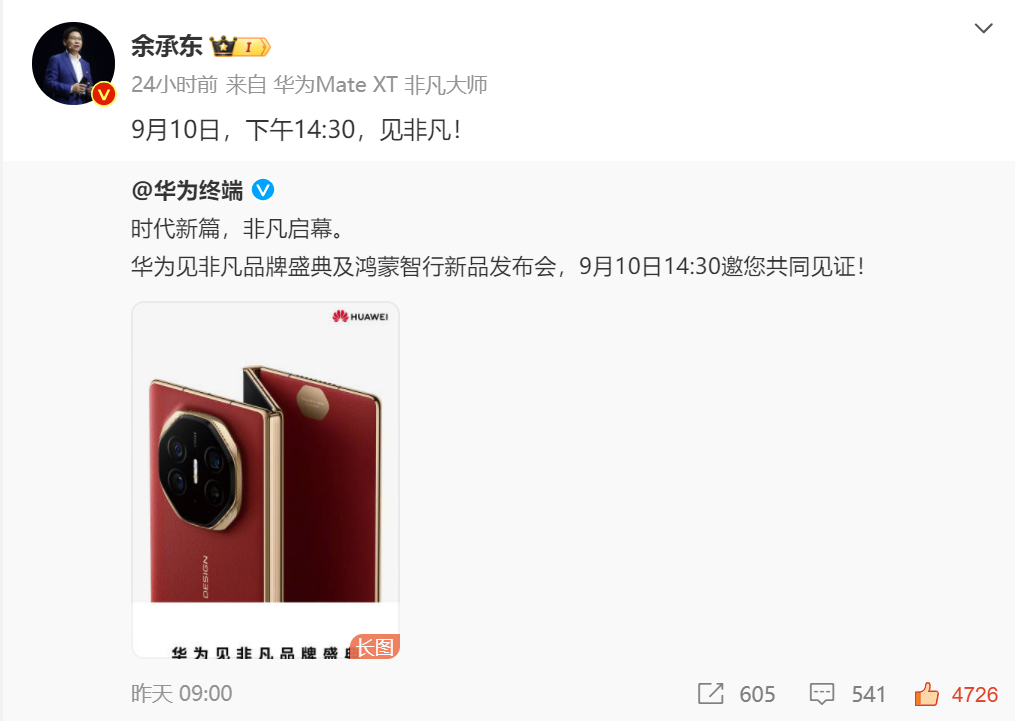
After the launch of Apple's new devices, the capital market reaction was relatively muted, with the stock price closing up only 0.04% on September 10. However, Apple remains the world's most valuable company with a total market value of $3.359 trillion.
1
Apple's New Devices Without Price Increase
According to BT Finance's review of Apple's official Chinese website, the screen sizes of the four new iPhone 16 and iPhone 16 Plus models are essentially unchanged from the previous generation, but there are more color options available, including white, black, blue, green, and pink. Pricing remains the same as the iPhone 15 series, ranging from 5,999 to 13,999 yuan.
Apple's sales strategy remains the same as before, with pre-orders starting this Friday and shipments commencing the following Friday. The only notable highlight is Apple's AI functionality, which will be available in English in October but will not be supported in Chinese until next year, when Apple plans to offer it as a free software update.
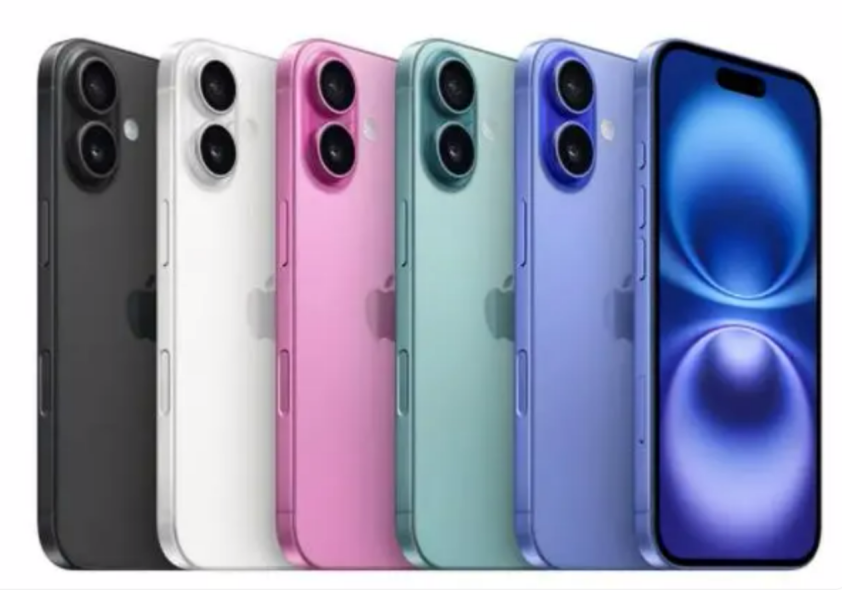
Judging from the new products unveiled at the launch event, the iPhone 16 has undergone minor hardware upgrades, particularly with the inclusion of the 3nm A18 chip across the entire lineup. However, the price remains unchanged, which is somewhat unconventional for Apple.
Previously, CFRA Research's technology analyst Angelo Zino predicted that the iPhone 16 series prices might increase across the board due to the addition of more AI features. This could be related to Apple's push for increased sales volumes. Earlier, TF International Securities analyst Ming-Chi Kuo reported that Apple had revised its shipment forecast for the 2024 iPhone 16 series upwards from 87-88 million units to 88-89 million units.
Bloomberg reported that this fall's launch event was crucial for Apple, which has seen sluggish sales of smartphones and wearable devices in recent quarters. With a launch date of September 20, the event prepares the company for its fourth fiscal quarter, and analysts predict a year-over-year growth of 5% for Apple in this quarter. Revenue growth in the previous three quarters was only 2.07%, -4.31%, and 4.87%, respectively, so the launch of the new devices is expected to provide a boost to revenue.
This launch event is crucial. The new iPhone 16 will go on sale on September 20, meaning that a portion of its revenue will be recognized in Apple's fourth fiscal quarter, during which the company expects sales to increase approximately 5% year-over-year. The following quarter, coinciding with the holiday season, is expected to see even greater sales growth, with analysts predicting a 7% increase in revenue to $128.4 billion.
2
3.3 Million Pre-Orders for Huawei's New Device
The highlight of Huawei's launch event was the unveiling of the world's first triple-folding phone, the HUAWEI Mate XT Masterpiece.
As of noon on September 10 on Huawei's official website, pre-orders for the device had already approached 3.3 million, a number that is expected to continue rising throughout the launch event. This suggests that the Mate XT has a high likelihood of replicating the success of the Mate60 series.
At 2:35 PM on September 10 (with a 5-minute delay), Yu Chengdong personally attended Huawei's new product launch event and unveiled the world's first triple-folding phone, the Huawei Mate XT Masterpiece.
According to Yu Chengdong, the new phone unfolds into a 10.2-inch screen, making it the largest foldable phone in the world in terms of screen area, while also being only 3.6 mm thick. He also announced the phone's pricing: 19,999 yuan for the 256GB version, 21,999 yuan for the 512GB version, and 23,999 yuan for the 1TB version. Pre-orders will begin on September 20 at 10:08 AM. Despite its higher price than the iPhone 16, the announcement elicited cheers from the audience.

Huawei is a pioneer in foldable phones. Since the launch of the first domestic foldable phone, the HUAWEI Mate X series, in 2019, Huawei has directly driven the domestic foldable phone market, achieving year-over-year growth rates exceeding 100% for four consecutive years. According to IDC data, shipments of foldable phones in China totaled 4.43 million units in the first half of 2024. Huawei leads the market with shipments of 1.892 million units and a market share of 43%, followed by Honor with a 23.3% market share and shipments of 1.034 million units.
The Huawei Mate XT, which was just announced on September 10, has already received over 3 million pre-orders even before the launch event ended, exceeding the company's shipments for the entire first half of the year.
Huawei's new product launch event did not directly address or compare itself to Apple's event just a few hours earlier. Judging from the current number of pre-orders, Huawei appears to be temporarily ahead. Huawei has previously outperformed Apple in the Chinese market, where Apple's influence is gradually waning, while Huawei's dominance in the high-end market has become the norm. Although OPPO, Xiaomi, and VIVO are all excellent representatives of domestic phone brands, Huawei is currently the only one capable of defeating Apple in China.
Regarding Huawei's new product launch, the Economic Observer published an article titled "Huawei and Apple Face Off, With Surpassing Apple as the Historical Mission of Chinese Tech Giants." The futuristic Huawei launch event may have heightened Apple's sense of crisis.
The Economic Observer reported that launching new products on the same day is a manifestation of Huawei's confidence. Huawei and Apple represent the best of Chinese and American brands, respectively. While a single launch event may not determine a definitive winner, it is clear that in recent years, following Huawei's resolution of chip issues, Huawei has been rising while Apple has been declining, contributing to Apple's sense of crisis.
3
Another Crisis for Apple: The Battle with Tencent
Recently, Apple and WeChat have frequently trended on social media due to their disagreements over the Apple tax. There were rumors that Apple might remove WeChat from the App Store, and WeChat was reported to be incompatible with the iPhone 16.
According to Hunan Daily, "WeChat may not support the iPhone 16, and users are advised not to update their systems." Apple supply chain sources claimed that due to the dispute with WeChat, Apple had reduced its initial iPhone 16 orders by 30%. In the ongoing battle between Apple and Tencent, Apple anticipates that this dispute could potentially affect iPhone 16 sales.
Although both Apple and Tencent subsequently denied the rumors, the damage to iPhone 16 sales has already been done. The rumor that Apple and WeChat would force users to choose between them sparked heated debate, with netizens overwhelmingly siding with WeChat. Some netizens commented, "If WeChat and Apple compete, I don't think Apple stands a chance. WeChat is irreplaceable, but Apple phones can easily be replaced." Others said, "Without WeChat in China, Apple phones are just electronic junk." Even influencer Luo Yonghao sided with WeChat, stating, "WeChat is not afraid of Apple."
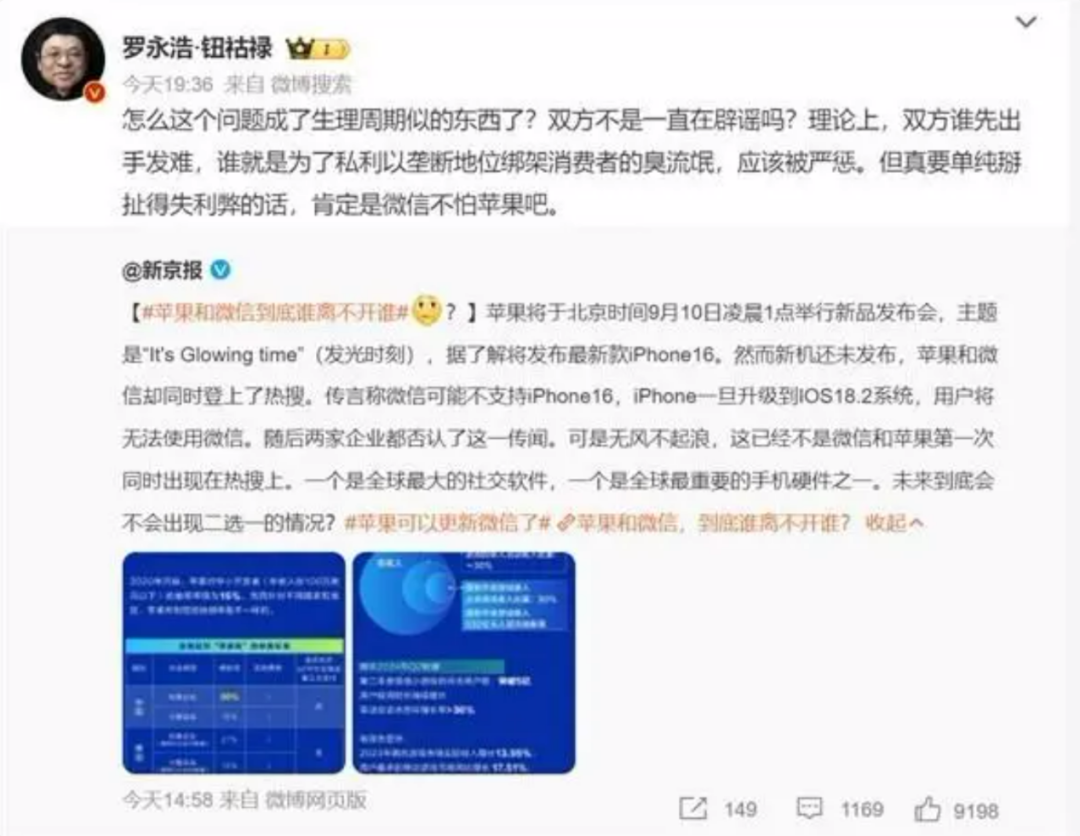
BT Finance observed that WeChat iOS has released a new version, 8.0.51, which adds new features to WeChat Moments and live streaming. The update of the WeChat iOS version means that the rumor of a forced choice between Apple and WeChat has been disproved. Analyst Shi Baogang believes that given the core interests involved for both parties, neither Apple nor Tencent is likely to make significant concessions. Currently, they have reached a temporary truce, but the underlying issue remains unresolved.
The core issue is the Apple tax, which stands at 12% in the US and Japan, 11% in South Korea, 17% in Europe, and a staggering 30% in China. This discriminatory treatment has caused considerable frustration for Chinese companies. Previously, Apple also charged a 30% Apple tax in Europe, but the EU deemed Apple's behavior in the app market as monopolistic and imposed hefty fines. Under intense scrutiny from the EU, Apple was forced to compromise.
What is the Apple tax? It is a set of app service terms introduced by Apple in 2017. Virtual currency tips are considered in-app purchases, and Apple takes a 30% cut, which must be processed through Apple's payment system. For example, when Apple users download apps, purchase digital goods or services within apps, or tip using virtual currency through the App Store, Apple automatically retains a portion of the transaction amount as a "toll" before transferring the remainder to the app developer.
According to Sensor Tower, the Apple tax generated approximately $22.34 billion (or over 40 billion yuan) in global revenue in 2023, with China accounting for more than 40 billion yuan of that total.
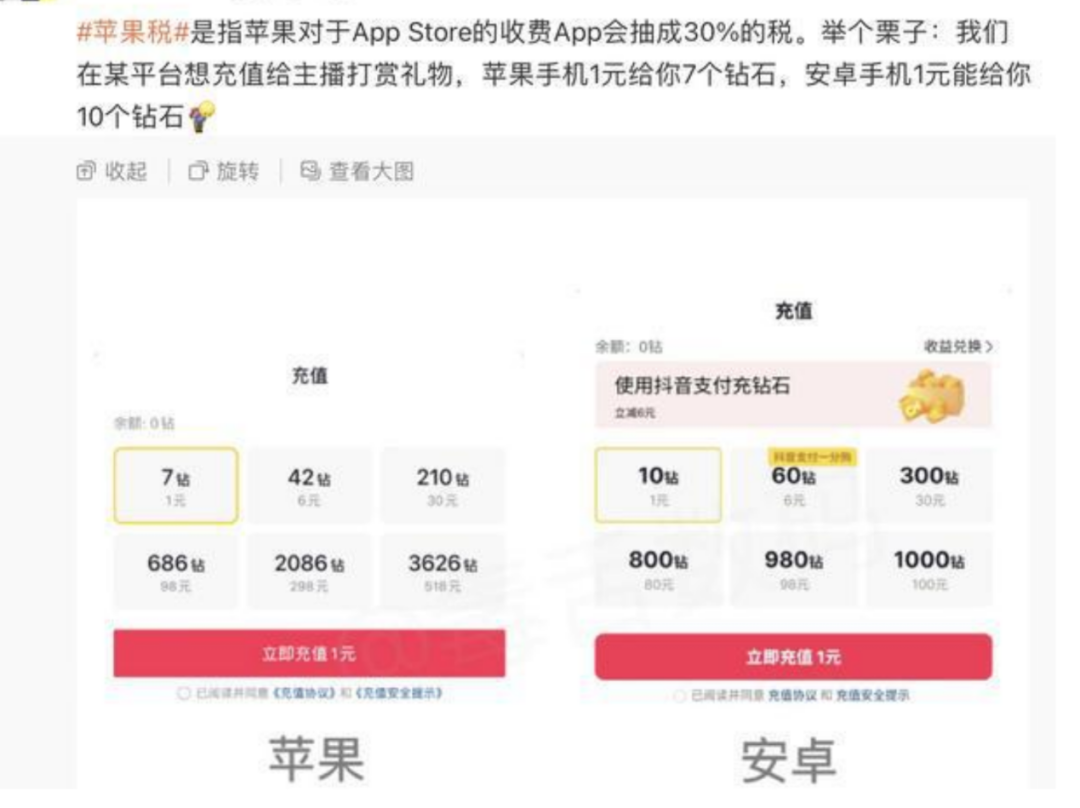
The core reason behind Tencent's confrontation with Apple is that Apple seeks to extend its tax reach into WeChat's ecosystem, such as by charging transaction fees for mini-programs. According to Tencent's financial reports, WeChat mini-programs had over 1.1 billion monthly active users in 2023. In January 2024, Apple announced its support for cloud games, casual games, and mini-programs developed by app developers to be integrated into its in-app purchase system, effectively imposing the Apple tax on these mini-programs. However, platforms like WeChat and Douyin have chosen to bypass Apple's payment system for transactions.
With declining sales in China, Apple has placed even greater importance on the Apple tax, particularly given WeChat's massive user base of 1.1 billion monthly active users. Apple is unlikely to relinquish this significant revenue source, but Tencent will not allow Apple to interfere with its ecosystem, which boasts a vast user base that serves as a formidable bargaining chip. As one netizen put it, "WeChat is a necessity for socializing and daily life, while Apple phones are not. We can always switch to Huawei or Xiaomi."
In July, Tencent disclosed that its casual game platform had served over 400,000 developers in 2023, with over 80% of them belonging to small teams of 30 people or less. More than 240 games generated quarterly revenues exceeding 10 million yuan. Tencent's initial philosophy is "to enable creators to realize their value and reap rewards." The core focus of these negotiations is ensuring the survival of small and medium-sized developers, which is also Tencent's primary concern in these talks. The imposition of an additional 30% Apple tax could make it difficult for tens of thousands of developers to survive.
4
An Unprecedented Sense of Crisis for Apple
The iPhone 16 has been ridiculed by netizens for its "cookie-cutter" design. Luo Yonghao commented in his livestream that apart from changing the camera placement, there has been no real innovation in iPhones over the years. Fortunately, the price of the iPhone 16 has not increased.
Ultimately, this may be directly related to Apple's declining performance. According to Bloomberg, Apple has laid off employees four times this year, which is unprecedented and suggests that the days of easy profits may be over for the company.
Apple experienced a rare negative growth in its second fiscal quarter. According to its financial report, Apple's revenue for the second quarter of 2024 was $90.75 billion, down 4.31% year-over-year, with net income of $23.64 billion, down 2.17% year-over-year. Following a decline in both revenue and net income in the second quarter of 2023, Apple experienced another decline in both metrics in the second quarter of 2024. From the second quarter of 2023 to the second quarter of 2024, revenue growth rates were -2.51%, -1.40%, -0.72%, 2.07%, and -4.31%, respectively, with declines in four out of the five quarters. While the first quarter of 2024 saw positive revenue and net income growth, as well as recent highs in gross and net profit margins, the second quarter saw a direct decline of 2.32 percentage points in net profit margin.
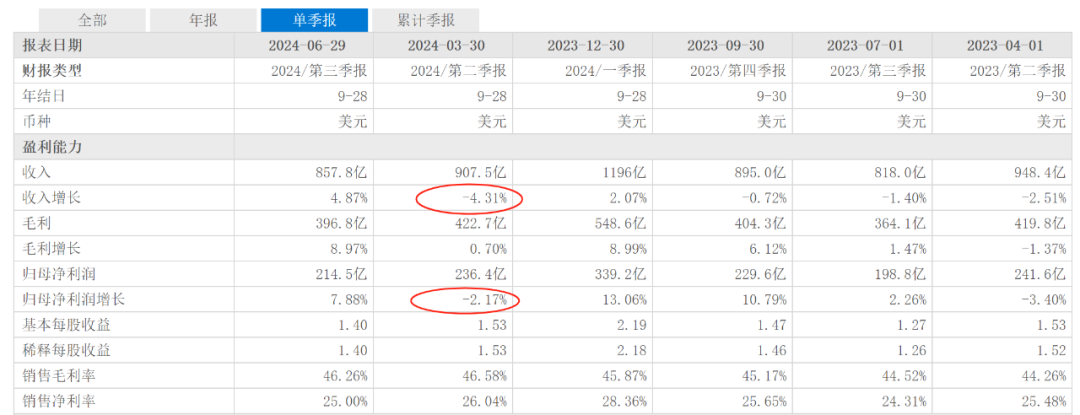
Apple recently released its financial results for the third quarter of 2024, which showed revenue and net income growth compared to the previous quarter's declines. However, this does not necessarily mean that Apple has successfully navigated its crisis, as its most important revenue source, the iPhone, generated $39.296 billion in revenue, down 0.9% year-over-year, marking the second consecutive quarterly decline.
One of Cook's biggest headaches is the continuing decline in Greater China. Apple's sales in Greater China fell 6.5% year-over-year in the third fiscal quarter to $14.728 billion, down from $15.758 billion in the same period last year. Among Apple's five regions, revenue grew in the Americas, Japan and Korea, Europe, and the Asia Pacific, but only declined in Greater China, marking the fourth consecutive quarterly decline in the region.
Apple, which previously clashed with WeChat, may have been influenced by declining sales in China and has begun to actively court Tencent. During the press conference, Apple also used the iPhone 16 to showcase Tencent Timi Studio's new game, "Honor of Kings: World," and announced its release on the iPhone 16 next year. This serves as a hint that the relationship between Apple and Tencent remains tight.
Financial analyst Xu Yi noted that while Apple is the tech company with the highest global market value, its recent quarterly performance indicates a sense of crisis. Xu Yi pointed out, "The latest domestic smartphone market report for the second quarter of 2024 released by renowned research firm Canalys shows that Apple has fallen out of the top five, while new products from various brands equipped with innovative technologies such as AI large models have significantly contributed to the improvement of domestic brand market performance. This will intensify competition for Apple in China, and its crisis has not been resolved."
Apple's sense of crisis also stems from investor distrust. Warren Buffett, the Warren Buffett, invested $36 billion in Apple shares. However, Berkshire Hathaway's second-quarter report disclosed in August 2024 showed a substantial reduction in its Apple holdings, from 789 million shares in the first quarter to approximately 400 million shares in the second quarter, a decrease of nearly 50%. Buffett previously earned an 800% return on his Apple investment, and his current reduction in holdings indicates a lack of confidence in Apple's ability to continue high growth. Buffett's move has also caused many investors to question whether Apple can still achieve high growth.
Currently, Huawei poses a challenge to Apple in the Chinese market. According to research from market research firm Canalys, in the second quarter of this year, Apple fell out of the top five smartphone vendors in China. Meanwhile, Huawei's smartphone shipments in the Chinese market increased by 41% year-on-year in the second quarter, making it the fastest-growing brand among the top five.
Looking back, during the three years when Huawei was silent, no other domestic manufacturer could compete with Apple, which comfortably held the top spot in China's high-end market. But now Huawei is back!
The article represents the author's personal views. If you have any questions or feedback, please leave a comment in the comment section.

